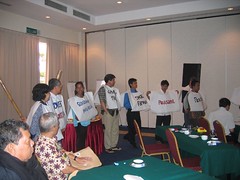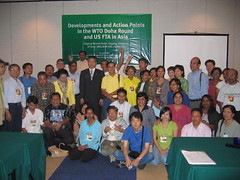PRESS RELEASE
Taiping, Malaysia
June 23, 2006
 Nine million small farmers and producers from ten countries in Asia call on governments of developing agricultural countries to ensure that “pro-small farmer” rules will be agreed in the current WTO negotiations in Geneva as well as in bilateral agreements currently forged by their governments with the United States.
Nine million small farmers and producers from ten countries in Asia call on governments of developing agricultural countries to ensure that “pro-small farmer” rules will be agreed in the current WTO negotiations in Geneva as well as in bilateral agreements currently forged by their governments with the United States.
The Asian Farmers’Association for Sustainable Rural Development (AFA), an alliance of nine million farmers from eight countries in Asia, launched in Kuala Lumpur in 2002, supports the proposal of developing countries’ blocs in WTO in pushing for significant number and meaningful treatment of special products as well as for effective use of special safeguard mechanisms. AFA also strongly calls governments of developing countries to move slowly , carefully and cautiously in forging bilateral free trade agreements (FTAs) with the USA , as such agreements are observed to be detrimental to the lives of poor and subsistence agricultural farmers and producers.
cautiously in forging bilateral free trade agreements (FTAs) with the USA , as such agreements are observed to be detrimental to the lives of poor and subsistence agricultural farmers and producers.
AFA leaders are currently in Taiping to participate in the four-day 6th General Assembly of the Asian Partnership for the Development of Human Resources in Rural Areas (AsiaDHRRA) , a regional network of non-government organization in ten countries in Asia. The General Assembly is hosted by AsiaDHRRA’s member in Malaysia, the DHRRA Network Malaysia headed by Mr. Marimuthu Nadason.
Support for SP and SSM
“We want the DOHA Round to be really for the development and benefit of small farmers and producers. We want it to correct the unjust imbalances in trade between poor and rich countries. “We call on our Indonesian government to continue to lead the G33 bloc in WTO in pushing for protection of our basic crops. “said Sambito, a small farmer from Indonesia , Chairperson of Aliansi Petani Indonesia and Executive Committee member of AFA. “We call on the Malaysian and Thai governments to support the G33’s position on Special Products (SPs) and Special Safeguard Mechanisms (SSM) â€
The G33 bloc pushes for the significant number and meaningful treatment of self-designated SPs and the adoption of SSM. The SPs will be identified by each country based on food security , livelihood security and rural development . These SPs will be given market access flexibilities: such as exemptions from further tariff reduction . SSM, on the other hand, allows developing countries to apply additional tariffs in cases of import surges or price depression. The Malaysian government has recently proposed numerical indicators for SPs, which drew criticisms from G33 members.
“We are happy that other major groupings in WTO, such as the African Group, the ACP group, and the LDC group are now also pushing for special products and special safeguard mechanisms”, added Sambito. “We call on these groupings to defend this position. Do not sacrifice us, small farmers, in the Doha Round. Do not sign to new agreements if the instruments of special product and special safeguard mechanisms are not in place. ”
Worries about US FTAs with Asian countries
Asian farmers are also worried with the free trade agreements being forged swiftly by the United States in many countries in Asia. “ We Korean farmers want the Korea-US FTA to stop. Our agriculture, our farmers, stand to lose in this agreement,†said Seo, Jung Eui, Chairperson of AFA and also chairperson of the Korean Advanced Farmers’Federation (KAFF) , an AFA member.
The Korean research institute on Rural Economics estimates that with the US –Korea FTA, there will be a decrease in the income of Korean agriculture by as much as $2.3 B. The imported cheap cereals will lead to the fall of the production by 20.1%. Cattle, pork and poultry productions will fall by 14.5% .
The United States has forged an FTA with Singapore, has launched the negotiation in Malaysia last week, is currently negotiating for an FTA with Korea, and Thailand, and is planning to negotiate with Philippines and Indonesia. The US-Mexico FTA have negatively affected the small Mexican farmers.
“Should the Korea-FTA be signed, this will lead to the continuation of big transnational corporations. This will mean more use of chemical pesticides and fertilizers , which will then lead to further destruction of the country’s ecosystem, ” Chairperson Seo added.
â€We call on Asian governments to take the FTA negotiations slowly, carefully, and have the welfare of the small farmers and the agriculture sector in mind. We call on our governments to be transparent in the negotiation process, to make open the proposals being given by both sides. Governments should include us, farmers, in studying and crafting the agreement. Farmers in Malaysia, in Thailand, in Indonesia, in Philippines, should study the proposals and make sure their voices are heard,†Chairperson Seo emphasized. .
The Korean farmers, led by KAFF, are in the forefront of advocacy in the stoppage of a Korea-US FTA , doing a series of protest actions, lobby work with government and mass campaign to sensitize the public about the damage of such agreement.
Asian Farmers’Association for Sustainable Rural Development (AFA)
For further inquiries, please contact :
Ma. Estrella A. Penunia, Secretary General, AFA (632) 426-6739, +639178138698
Marimuthu Nadason, Chairperson, AsiaDHRRA, (603) 787-60520



Comments are closed